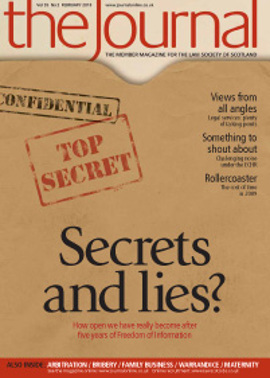Balancing exercise

In 2007 “celebrity chef” Marco Pierre White’s wife initiated divorce proceedings against him in England. She claimed ancillary relief. In pursuance of that claim she “obtained” 42 documents and handed them to her solicitor, who retained them. Some were said to be “originals”, and some “copies”. It was accepted that all the documents contained information private to Mr White and that the “original” documents belonged to him.
Most of the documents related to Mr White’s financial affairs (however one was a letter from his daughter from a previous marriage to which he had been given no opportunity of reply). One document intercepted by the wife appears to have been a proposed commercial contract between Mr White and a third party. When Mr White did not receive the contract, the matter was investigated. He alleged that his wife then informed him that she had been advised by her solicitor to intercept his mail and take his documents – a statement which both she and her solicitor later refuted. Mr White’s lawyers then demanded of the wife’s lawyers that the contract be returned together with any other “Hildebrand” documents retained by them. They declined, founding on the rule in Hildebrand v Hildebrand [1992] 1 FLR 244.
Mr White brought proceedings against his wife and her solicitors. The case was initially dismissed but in October 2009 the Court of Appeal took the view that there was a case for the solicitors to answer. So what is the law?
Improper actings
The appeal court (per Lord Justice Ward) summarised the rule in Hildebrand thus:
“The Family Courts will not penalise the taking, copying and immediate return of documents but do not sanction the use of any force to obtain the documents, or the interception of documents, or the retention of documents nor I would add, though it is not a feature of this case, the removal of any hard disk recording documents electronically. The evidence contained in the documents, even those wrongfully taken will be admitted in evidence because there is an overarching duty on the parties to give full and frank disclosure. The wrongful taking of documents may lead to findings of litigation misconduct or orders for costs.”
The judgment considers this issue in some detail, raising numerous and fascinating issues which are outwith the scope of this note. As to when the action taken might be “improper”, it was considered that (i) the use of force to obtain documents, (ii) the interception of the other party’s mail, and (iii) the retention of original documents, would render it so. In terms of Scots law one might reasonably think that axiomatic since each of these activities has the potential to be a criminal offence either under statute or common law.
Nevertheless, the case places in sharp focus the advice which family lawyers can and cannot give their clients in terms of recovery of documents or financial information not belonging to them. Family lawyers may share my own view that our rules for such recovery in the context of divorce proceedings are inadequate. There is, for example, no provision formally obliging parties to a divorce to make a full and frank disclosure of their financial affairs for the purposes of the litigation. There may be an expectation that parties will do so, but there it ends. Section 20 of the Family Law (Scotland) Act 1985 is an option only and is relatively toothless in ensuring compliance.
Relevant principles
The majority of the delays, and much of the expense, in financial provision cases concern non-disclosure. Where there is a reasonable suspicion of concealment by the other party, the temptation to retain and use any and all available financial information can be considerable. There is an obvious need for reform. Our English colleagues at least have the comfort of a statutory obligation under the Matrimonial Proceedings Act 1973.
In the meantime Scots family lawyers should have a care. As Eady J observed at an earlier stage in the White case, “The law regarding interference with personal property may have application notwithstanding a marital relationship”. That principle must also apply in this jurisdiction.
It was also noted that interference with correspondence is contrary to the right of privacy protected by article 8 of ECHR. Adjusting the balance between that right and a claimant’s right to recovery of documents is not easy. However, I respectfully suggest that the broad thrust of the Hildebrand rule is a useful starting point for Scots lawyers faced with papers produced by their client which may have been “improperly” obtained.
Don’t retain “originals” which belong to a third party. Don’t retain anything which is irrelevant to the case. Do not encourage your client to open lockfast places to retrieve financial information. Do give your client clear advice about the lawful steps they may take to recover information.
The full judgment in White v Withers is at [2009] EWCA Civ 1122. Read it and quake.
Leonard Mair, head of the Morton Fraser Family Law Team
In this issue
- More prejudicial than probative?
- Another age
- Resolution is the key
- On the record
- Chequing out
- ABS workout
- Know your books
- Family business and business families
- Forum of choice?
- A right to silence?
- What does it mean to be a solicitor?
- Traineeships down over 25%
- Law reform update
- From the Brussels office
- Appreciation: Alfred Phillips
- Appreciation: John Sinclair
- Training for success
- From here... to maternity
- Ask Ash
- The move in-house - do you have what it takes?
- Big decisions
- Balancing exercise
- Belief boundaries
- Details, details, details
- Scottish Solicitors' Discipline Tribunal
- Website review
- Book reviews
- Tougher regime
- No guarantees?
- Title insurance for insolvency practitioners
- PSG update






